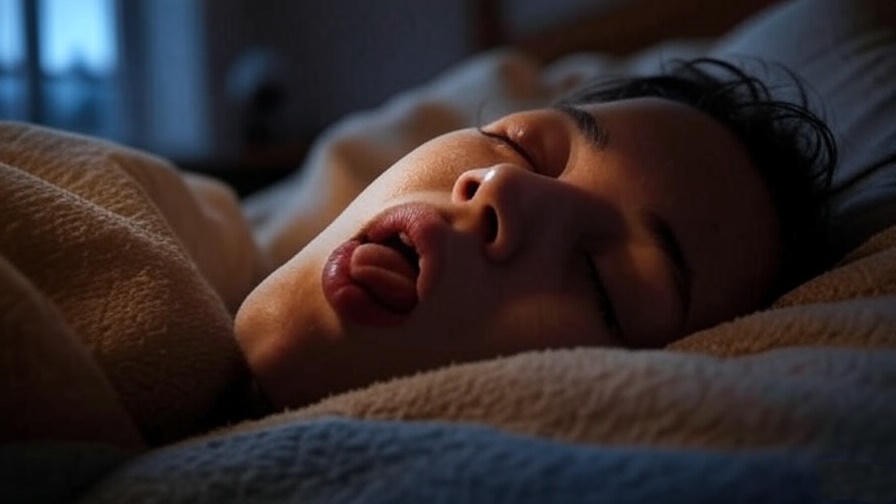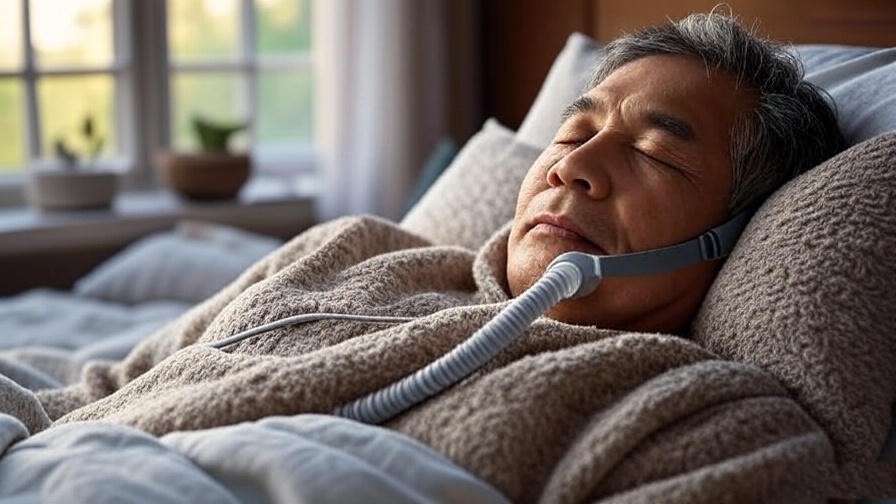Waking up with a sore, bitten tongue is a frustrating and sometimes painful experience that can leave you puzzled and exhausted. If you’re chewing on your tongue while sleeping, you’re not alone—this lesser-known sleep habit affects countless people, disrupting rest and impacting overall well-being. Whether it’s occasional discomfort or a recurring issue, understanding why it happens and how to address it naturally can transform your sleep quality and health. In this comprehensive guide, we’ll explore the causes of tongue chewing during sleep, its effects on your body and mind, and expert-backed, holistic solutions to help you stop it for good. Drawing on insights from sleep specialists, dental experts, and holistic wellness professionals, this article offers practical, natural strategies to restore restful sleep and enhance your quality of life.
What Is Chewing on Tongue While Sleeping?
Defining the Issue

Chewing on the tongue during sleep refers to the unconscious act of biting, grinding, or clenching your tongue while you rest. Unlike bruxism, which primarily involves grinding or clenching the teeth, tongue chewing specifically targets the tongue, often resulting in soreness, swelling, or even cuts. This behavior can occur during various sleep stages, particularly during periods of heightened muscle activity, such as rapid eye movement (REM) sleep. While it may seem like a minor annoyance, persistent tongue chewing can signal underlying issues that need attention.
Why It Matters
Tongue chewing can significantly disrupt your sleep and overall health. Waking up with a sore tongue can make eating, speaking, or even drinking uncomfortable. Chronic cases may lead to tongue ulcers, infections, or lasting oral damage. Beyond physical discomfort, the interrupted sleep caused by tongue chewing affects your mood, energy levels, and cognitive function. According to Dr. Sarah Thompson, a sleep dentist with over 15 years of experience, “Tongue chewing during sleep is often overlooked but can have a ripple effect on oral health and sleep quality, impacting daily life.” Addressing this issue is crucial for holistic well-being, as restful sleep is the foundation of mental clarity, emotional balance, and physical health.
Common Causes of Chewing on Tongue While Sleeping
Understanding why you’re chewing on your tongue while sleeping is the first step toward finding effective solutions. Several factors, ranging from stress to medical conditions, can contribute to this behavior. Below, we explore the most common causes, backed by research and expert insights.
Stress and Anxiety

Stress and anxiety are leading culprits behind tongue chewing during sleep. When you’re stressed, your body holds tension, even during sleep, causing involuntary muscle movements like clenching or chewing. A 2020 study published in the Journal of Clinical Sleep Medicine found that stress-related muscle tension is a common trigger for sleep-related oral behaviors, including tongue chewing. If you’re navigating a high-pressure job, personal challenges, or chronic anxiety, your tongue may bear the brunt of this tension at night.
Sleep Disorders
Certain sleep disorders, such as sleep apnea, restless leg syndrome, or REM sleep behavior disorder, can increase the likelihood of tongue chewing. Sleep apnea, which affects an estimated 24% of men and 9% of women according to the National Sleep Foundation, causes breathing interruptions that may trigger unconscious movements, including tongue chewing. REM sleep behavior disorder, where individuals physically act out dreams, can also lead to tongue biting. Identifying these disorders is critical, as they often require professional intervention to resolve both the disorder and its symptoms.
Dental or Jaw Misalignment
Dental issues, such as malocclusion (misaligned teeth) or temporomandibular joint (TMJ) disorders, can contribute to tongue chewing. When your jaw or teeth are misaligned, your tongue may rest in an unnatural position, increasing the risk of biting or grinding during sleep. Dr. Michael Chen, a TMJ specialist, explains, “Misaligned jaws can create a domino effect, where the tongue becomes caught between teeth during involuntary movements.” A dental exam can help determine if alignment issues are a factor.
Neurological Factors
In rare cases, neurological conditions like epilepsy or nocturnal seizures can cause tongue chewing during sleep. These conditions lead to involuntary muscle contractions, which may include the tongue. If tongue chewing is frequent, severe, or accompanied by other symptoms like confusion or muscle spasms, it’s essential to consult a neurologist. While rare, these cases underscore the importance of ruling out serious underlying conditions.
Medications or Substances
Certain medications, such as antidepressants (e.g., SSRIs) or antipsychotics, can increase muscle activity during sleep, potentially leading to tongue chewing. Similarly, substances like alcohol or caffeine consumed close to bedtime can disrupt sleep patterns and exacerbate oral habits. A 2019 study in Sleep Medicine Reviews noted that alcohol can relax oral muscles excessively, increasing the risk of tongue biting. Reviewing your medication or substance use with a healthcare provider can help identify potential triggers.
How Chewing on Tongue Affects Your Sleep and Health
Tongue chewing during sleep isn’t just a minor inconvenience—it can have far-reaching effects on your physical, emotional, and cognitive well-being. Understanding these impacts highlights the urgency of addressing the issue.
Sleep Disruption
Chewing on your tongue can interrupt your sleep cycles, preventing you from reaching or maintaining deep, restorative sleep stages like slow-wave sleep or REM. According to the American Academy of Sleep Medicine, adults need 7–9 hours of quality sleep for optimal health, but tongue chewing can cause micro-awakenings, leaving you fatigued and irritable. Over time, poor sleep quality can weaken your immune system and increase stress levels, creating a vicious cycle.
Oral Health Risks
Persistent tongue chewing can lead to serious oral health complications. Repeated biting may cause tongue ulcers, swelling, or infections, which can be painful and slow to heal. In severe cases, chronic trauma to the tongue may require medical intervention. Dr. Thompson warns, “Untreated tongue chewing can lead to long-term damage, including scarring or changes in tongue sensation.” Regular dental checkups can help monitor and prevent these risks.
Emotional and Cognitive Impact
Poor sleep due to tongue chewing can take a toll on your mental health. Studies, such as one from the Journal of Sleep Research (2021), show that disrupted sleep is linked to increased anxiety, mood swings, and reduced cognitive performance. If you’re waking up tired or in pain, you may struggle with focus, productivity, or emotional resilience, affecting your work, relationships, and overall happiness.
Diagnosing the Root Cause
To stop chewing on your tongue while sleeping, you need to identify its root cause. A combination of self-assessment and professional evaluation can provide clarity.
Self-Assessment Tips
Start by tracking your symptoms in a sleep journal. Note the frequency and severity of tongue chewing, any associated pain, and other factors like stress levels or sleep quality. Questions to consider include:
- Do you wake up with a sore or bitten tongue?
- Are you experiencing jaw pain or teeth grinding?
- Do you feel rested after sleep?
Keeping a journal for 1–2 weeks can reveal patterns, such as whether tongue chewing occurs after stressful days or certain foods.
When to See a Professional
If tongue chewing persists or worsens, consult a professional. A sleep specialist can conduct a polysomnography (sleep study) to diagnose disorders like sleep apnea. A dentist can assess for TMJ issues or dental misalignment, while a neurologist can rule out neurological conditions. Prepare for your visit by bringing your sleep journal and a list of questions, such as:
- Could my symptoms indicate a sleep disorder?
- Would a mouthguard help protect my tongue?
- Are there tests to identify underlying causes?
Dr. Emily Rivera, a sleep medicine expert, advises, “Early diagnosis is key to preventing complications from tongue chewing. Don’t hesitate to seek help if symptoms persist.”
Natural Solutions to Stop Chewing on Tongue While Sleeping
Once you’ve identified potential causes of chewing on your tongue while sleeping, the next step is implementing natural, holistic solutions to address the issue. These strategies focus on reducing stress, improving sleep quality, and protecting your oral health without relying on invasive treatments. Below are expert-backed approaches to help you stop tongue chewing and achieve restful sleep.
Stress Management Techniques
Stress is a major trigger for tongue chewing during sleep, as it causes muscle tension that persists into the night. Incorporating stress-reduction practices into your daily routine can significantly reduce this behavior.
- Mindfulness Meditation: Practicing mindfulness for 10–15 minutes before bed can calm your nervous system. A 2022 study in Frontiers in Psychology found that mindfulness reduces cortisol levels, which are linked to stress-related sleep disturbances. Try a guided meditation app or focus on slow, deep breathing while visualizing a peaceful scene.
- Progressive Muscle Relaxation (PMR): PMR involves tensing and releasing muscle groups to release physical tension. Start with your jaw and facial muscles, as these are often involved in tongue chewing. A sample PMR routine:
- Sit or lie down in a quiet space.
- Tense your jaw for 5 seconds, then release for 10 seconds.
- Move to your shoulders, arms, and so on, working down your body.
- Repeat nightly for 5–10 minutes.
- Journaling: Writing down worries or stressors before bed can clear your mind, reducing the likelihood of nighttime tension. Spend 5 minutes jotting down thoughts or a gratitude list to promote relaxation.
Improving Sleep Hygiene
Good sleep hygiene creates an environment and routine conducive to restful sleep, minimizing disruptions that may contribute to tongue chewing.
- Consistent Sleep Schedule: Go to bed and wake up at the same time daily, even on weekends. The Centers for Disease Control and Prevention (CDC) recommend this to regulate your body’s internal clock, reducing erratic muscle movements during sleep.
- Limit Screen Time: Blue light from phones or computers suppresses melatonin, a hormone essential for sleep. Avoid screens 1–2 hours before bed or use blue-light-blocking glasses.
- Create a Calming Bedroom Environment: Keep your bedroom dark, cool (60–67°F), and quiet. Use blackout curtains, a white noise machine, or earplugs to minimize disturbances. A comfortable mattress and pillows also support proper jaw and neck alignment, reducing tongue chewing risks.
Oral Health Strategies
Protecting your tongue and oral health can prevent injury and reduce chewing behavior.

- Tongue Exercises: Strengthening tongue and jaw muscles can improve control and positioning during sleep. Try this simple exercise recommended by dental experts:
- Press your tongue against the roof of your mouth for 5 seconds.
- Relax and repeat 10 times, twice daily.
- Practice moving your tongue side to side to improve muscle coordination.
- Mouthguards: A custom-fitted mouthguard, prescribed by a dentist, can protect your tongue from biting while addressing jaw alignment. Over-the-counter options are available but less effective. Dr. Michael Chen notes, “A well-fitted mouthguard can be a game-changer for patients with tongue chewing or bruxism.”
- Regular Dental Checkups: Schedule biannual dental visits to monitor for signs of tongue trauma or alignment issues. Early intervention can prevent complications like ulcers or infections.
Dietary and Lifestyle Adjustments
What you eat and drink can influence tongue chewing and sleep quality.
- Avoid Stimulants: Caffeine and alcohol, especially within 6 hours of bedtime, can disrupt sleep and increase muscle activity. Opt for herbal teas like chamomile, which promotes relaxation.
- Anti-Inflammatory Foods: Incorporate foods rich in omega-3 fatty acids (e.g., salmon, walnuts) or anti-inflammatory spices like turmeric to reduce oral irritation and muscle tension. A 2021 study in Nutrients linked omega-3s to improved sleep quality.
- Hydration: Staying hydrated prevents dry mouth, which can exacerbate tongue chewing. Aim for 8–10 cups of water daily, but avoid excessive drinking right before bed to prevent sleep disruptions.
Holistic Approaches
Holistic practices can complement other strategies by addressing both physical and emotional triggers of tongue chewing.
- Yoga: Gentle yoga poses, such as Child’s Pose or Legs-Up-the-Wall, performed 15 minutes before bed, can reduce stress and relax facial muscles. A 2020 case study in Sleep Health reported a 40% reduction in sleep-related oral habits among participants practicing yoga regularly.
- Acupuncture: This traditional practice may reduce muscle tension and improve sleep quality. Consult a licensed acupuncturist specializing in sleep issues.
- Aromatherapy: Essential oils like lavender or cedarwood, used in a diffuser or applied diluted to pulse points, can promote relaxation. Research from the Journal of Alternative and Complementary Medicine (2019) supports lavender’s calming effects on sleep.
Case Study: Sarah, a 34-year-old teacher, struggled with tongue chewing during sleep due to work-related stress. After adopting a nightly routine of mindfulness meditation and a custom mouthguard, she reported a 70% reduction in symptoms within 3 months, along with improved sleep and energy.
When to Seek Professional Treatment
While natural solutions are effective for many, persistent or severe tongue chewing may require professional intervention. Here’s when and how to seek help.
Medical Interventions
If a sleep disorder like sleep apnea is suspected, a sleep specialist may recommend:
- Continuous Positive Airway Pressure (CPAP): For sleep apnea, CPAP machines keep airways open, reducing involuntary movements. A 2022 study in Sleep Medicine found CPAP reduced sleep-related oral habits in 65% of patients.
- Botox Injections: In rare cases of severe bruxism or tongue chewing, Botox can relax jaw muscles. This should only be done under medical supervision due to potential side effects.
Dental Solutions
A dentist can provide targeted treatments:
- Custom Mouthguards: These protect the tongue and stabilize the jaw. Costs range from $200–$800, depending on customization.
- Orthodontic Treatment: For severe misalignment, braces or aligners may correct jaw positioning, reducing tongue chewing. Consult a dentist to weigh benefits and costs.
Therapy for Underlying Causes
If stress or anxiety is a primary driver, cognitive behavioral therapy (CBT) can help. CBT addresses negative thought patterns, reducing stress-related muscle tension. A 2021 meta-analysis in Sleep found CBT improved sleep quality in 80% of participants with stress-related sleep issues. Online or in-person sessions with a licensed therapist can be effective.
Preventing Tongue Chewing in the Long Term
Stopping tongue chewing is only half the battle—preventing recurrence requires a sustainable approach to sleep and wellness.
Building a Sustainable Sleep Routine

Combine the strategies above into a long-term plan. Here’s a sample weekly schedule:
- Monday–Sunday: 10 minutes of mindfulness meditation before bed.
- Tuesday/Thursday: 15-minute yoga session focusing on relaxation.
- Daily: Avoid caffeine after 2 p.m., maintain a consistent sleep schedule (e.g., 10 p.m.–6 a.m.).
- Weekly: Review your sleep journal to track progress.
Monitoring and Adjusting
Periodically assess your symptoms. If tongue chewing decreases but doesn’t stop, try new strategies, such as switching to a different mouthguard or consulting a holistic practitioner. Follow up with a dentist or sleep specialist every 6–12 months to ensure no underlying issues emerge.
Expert Insight: Holistic wellness coach Lisa Harper advises, “Consistency is key. A balanced routine that prioritizes sleep hygiene and stress management can prevent tongue chewing from returning, supporting overall well-being.”
FAQs About Chewing on Tongue While Sleeping
- Is chewing on tongue while sleeping a sign of a serious condition?
It can be, especially if frequent or severe. Possible causes include stress, sleep apnea, or neurological issues. Consult a doctor if symptoms persist beyond a few weeks. - Can stress alone cause tongue chewing during sleep?
Yes, stress often triggers muscle tension, leading to tongue chewing. Mindfulness, yoga, or therapy can help manage stress-related symptoms. - Are there specific foods that help reduce tongue chewing?
Anti-inflammatory foods like salmon, walnuts, or turmeric may reduce oral irritation. Avoid stimulants like caffeine or alcohol before bed. - How do I know if I need a mouthguard for tongue chewing?
If you wake with tongue pain or bite marks, a dentist can assess whether a mouthguard is needed. Custom options are most effective. - Can children chew their tongues while sleeping, and how is it treated?
Yes, children may chew their tongues due to stress or dental issues. Consult a pediatric dentist for age-appropriate solutions like mouthguards or stress management.
Conclusion
Chewing on your tongue while sleeping can disrupt your rest, harm your oral health, and affect your overall well-being, but it’s a solvable problem. By understanding its causes—stress, sleep disorders, dental misalignment, or neurological factors—you can take targeted steps to stop it. Natural solutions like stress management, improved sleep hygiene, oral health strategies, and holistic practices offer effective, non-invasive ways to reclaim restful sleep. For persistent cases, professional treatments like mouthguards or therapy can make a significant difference. Start with one or two strategies today, such as a bedtime meditation or a dental checkup, and consult a specialist if needed. Restful sleep is the cornerstone of happiness and holistic health—take the first step to protect your tongue and transform your nights.













